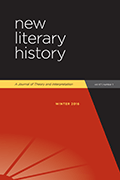
Johns Hopkins UniversityEst. 1876
America’s First Research University
Interpretation and its rivals
Guest post by Rita Felski Is interpretation a historically limited practice that is now in decline? Or, at a time when the humanities are under attack, should we defend interpretation as lying at the very heart of what we do? These are the questions to be addressed at a conference taking place at the University of Virginia on September 19 and 20. Sponsored by the journal New Literary History, the conference brings ten renowned scholars from different disciplines and countries to the grounds of the university  Speakers at the conference will address the value of interpretation in the university and in everyday life. In literary studies, for example, there has been a recent turn away from interpretation. Echoing the arguments of Susan Sontag in her essay “Against Interpretation,” critics worry that interpretation has become stifling. We are so eager to decipher what a text means that we pay little attention to how it means—to its language, texture, form. These critics urge us to spend more time on describing art works rather than interpreting them. Perhaps, as Sontag suggests, we need to recover our senses; to see more, to hear more, to feel more—to create an erotics rather than a hermeneutics of art. The ever-expanding reach of internet and media culture is also prompting scholars to wonder if interpretation is a dying art. Is the art of close reading tied to a slowly disappearing culture of the book? Perhaps the virtues of slow and patient deciphering are out of tune with our decreasing attention spans—our practices of surfing, sampling, and skimming in an age of distraction. Other critics, however, are eager to reclaim the value of interpretation as something unique to the humanities. At a time when knowledge is often equated with “measurable skills” and “content delivery,” the idea of interpretation offers a more complex view of education—one in which there is no single right answer and what we know cannot be separated from how we know it and why it is worth knowing. Interpretation, in this line of thought, is why the humanities matter. It lies at the very heart of their unique and irreplaceable role in the contemporary university Those scheduled to speak at the New Literary History meeting include Linda Alcoff, Jeffrey Alexander, T.J. Clark, Antoine Compagnon, Steven Connor, N. Katharine Hayles, Sharon Marcus, David Scott, Susan Stewart, and Zhang Longxi. Essays from the conference will be published in a future edition of New Literary History.
Speakers at the conference will address the value of interpretation in the university and in everyday life. In literary studies, for example, there has been a recent turn away from interpretation. Echoing the arguments of Susan Sontag in her essay “Against Interpretation,” critics worry that interpretation has become stifling. We are so eager to decipher what a text means that we pay little attention to how it means—to its language, texture, form. These critics urge us to spend more time on describing art works rather than interpreting them. Perhaps, as Sontag suggests, we need to recover our senses; to see more, to hear more, to feel more—to create an erotics rather than a hermeneutics of art. The ever-expanding reach of internet and media culture is also prompting scholars to wonder if interpretation is a dying art. Is the art of close reading tied to a slowly disappearing culture of the book? Perhaps the virtues of slow and patient deciphering are out of tune with our decreasing attention spans—our practices of surfing, sampling, and skimming in an age of distraction. Other critics, however, are eager to reclaim the value of interpretation as something unique to the humanities. At a time when knowledge is often equated with “measurable skills” and “content delivery,” the idea of interpretation offers a more complex view of education—one in which there is no single right answer and what we know cannot be separated from how we know it and why it is worth knowing. Interpretation, in this line of thought, is why the humanities matter. It lies at the very heart of their unique and irreplaceable role in the contemporary university Those scheduled to speak at the New Literary History meeting include Linda Alcoff, Jeffrey Alexander, T.J. Clark, Antoine Compagnon, Steven Connor, N. Katharine Hayles, Sharon Marcus, David Scott, Susan Stewart, and Zhang Longxi. Essays from the conference will be published in a future edition of New Literary History.  Rita Felski is William R. Kenan, Jr., Professor of English at the University of Virginia and the editor of New Literary History. She is also the coeditor of the recently published Comparison: Theories, Approaches, Uses and the editor of Rethinking Tragedy.
Rita Felski is William R. Kenan, Jr., Professor of English at the University of Virginia and the editor of New Literary History. She is also the coeditor of the recently published Comparison: Theories, Approaches, Uses and the editor of Rethinking Tragedy.

